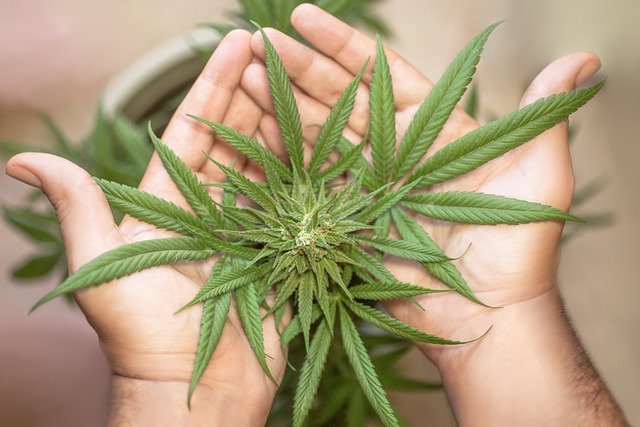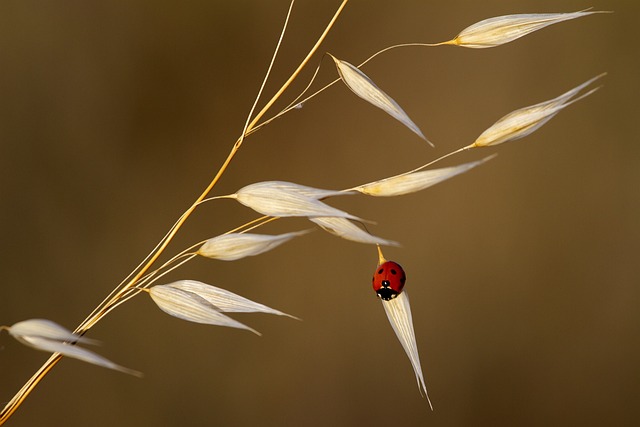In Delaware, THCA (Tetrahydrocannabinolic Acid) products are navigating a complex legal landscape. Recreational cannabis is decriminalized for adults over 21, permitting up to one ounce of THC-containing substances. However, THCA flower with naturally occurring higher levels of THC (up to 3% by weight) can only be legally obtained through the state's compassionate use program, aligning with both federal and state laws including the Delaware Medical Marijuana Act. This is to ensure compliance and avoid legal issues. On the cultivation front, growing THCA flowers in Delaware requires careful attention to climatic conditions, with optimal temperatures of 68-80 degrees Fahrenheit, controlled humidity between 40-50%, and high-quality loamy soil. Cultivators must also employ protective measures for adverse weather, prune and train plants for better growth, and use organic pest control to maintain plant health without chemical residues. Regular monitoring and prompt interventions are necessary to protect against pests and diseases, ensuring the yield and potency of THCA flowers. Compliance with Delaware's cultivation laws is essential for both legal operation and successful harvests. This overview highlights that while THCA is a legal entity in Delaware, its cultivation and possession require careful adherence to state regulations and an understanding of local growing conditions.
Exploring the nuances of THCA flower cultivation and legality within Delaware’s framework, this comprehensive article serves as a vital resource for gardeners, farmers, and consumers interested in the benefits and potential of THCA. From understanding the legal landscape of THCA flower possession and sale to mastering cultivation techniques tailored to Delaware’s climate, this guide illuminates the path for those looking to engage with this emerging market. We delve into the optimal growing conditions, processing best practices, cannabinoid profiles, and storage methods to ensure the potency and legality of THCA flowers in Delaware. Join us as we navigate the evolving landscape of THCA flower utilization, highlighting key legal aspects and future trends that will shape its role in the state’s agricultural and consumer markets.
- Understanding THCA Flower Legality in Delaware: A Comprehensive Guide
- Optimal Growing Conditions and Care for THCA Flowers in Delaware's Climate
Understanding THCA Flower Legality in Delaware: A Comprehensive Guide

In recent years, the conversation around cannabinoids and their derivatives has grown increasingly nuanced, with THCA (Tetrahydrocannabinolic Acid) garnering significant attention due to its potential therapeutic benefits. As of the latest updates, the legality of THCA flower in Delaware hinges on a few distinct factors. The Delaware State legislature has decriminalized cannabis for recreational use, allowing adults aged 21 and over to possess up to one ounce of THC-containing cannabis. However, when it comes to THCA flower specifically, it’s crucial to differentiate between hemp-derived THCA and THCA from cannabis plants where THC has not yet been decarboxylated. Hemp-derived products containing less than 0.3% THC are federally legal under the 2018 Farm Bill and are also legal in Delaware, provided they comply with state regulations. For those interested in THCA flower that naturally occurs above this threshold but contains no more than 3% THC by weight, it is essential to ensure that such products are obtained from licensed dispensaries as part of the state’s compassionate use program. This ensures compliance with both federal and state laws, including the Delaware Medical Marijuana Act. Users should be vigilant about the source and labeling of any THCA flower they purchase, adhering strictly to legal guidelines to avoid potential legal issues. Understanding the distinctions in the law is key for consumers in Delaware who wish to legally engage with THCA flower, as it navigates the fine line between legality and potential legal complications. Keeping abreast of the evolving regulations at both state and federal levels is advisable for anyone interested in this unique cannabinoid.
Optimal Growing Conditions and Care for THCA Flowers in Delaware's Climate

In Delaware, cultivating THCA flowers requires a careful balance of environmental factors due to its unique climate, which can vary from moderate humidity to more arid conditions depending on the region within the state. To thrive, THCA plants need a consistent temperature range, typically between 68 to 80 degrees Fahrenheit during the day and slightly cooler at night. Delaware’s growing seasons are favorable for these plants, with late spring through early fall providing ample time for growth. It’s crucial to monitor humidity levels, aiming for 40-50% to prevent mold or mildew while ensuring the plant stays hydrated. Soil quality is also a key factor; a loamy, well-draining soil rich in organic matter will promote robust growth. In the event of adverse weather, such as the occasional heavy rains or strong winds that can hit Delaware, protective measures like shade cloths or windbreaks may be necessary to safeguard your THCA plants.
When it comes to care, regular pruning and training of the plants can encourage better air circulation and light exposure, which are essential for optimal THCA production. Additionally, a regimen of organic pest control is recommended to maintain plant health without introducing harmful chemicals. Regular monitoring for pests and diseases, along with timely interventions, will help prevent any issues that could impact the yield or potency of the THCA flowers. In Delaware, where THCA is legal, adhering to state-specific regulations regarding cultivation practices and licensing is imperative for both legal compliance and successful harvests. Understanding the local climate and tailoring your cultivation practices accordingly will lead to a higher quality product and a successful THCA flower grow operation within Delaware’s boundaries.
Navigating the landscape of cannabinoids, Delaware residents have a particular interest in THCA flowers, both for their potential wellness benefits and as an object of study for those curious about the plant’s properties. This article has provided clarity on the legal status of THCA flower tips in Delaware, ensuring readers are informed on compliance and regulations. Additionally, insights into optimizing growth conditions tailored to Delaware’s unique climate ensure that both hobbyists and cultivators can cultivate these valuable plants effectively. With this knowledge, enthusiasts in the First State can confidently approach the cultivation and use of THCA flowers within the confines of the law, fostering a responsible community around this nascent area of interest.
